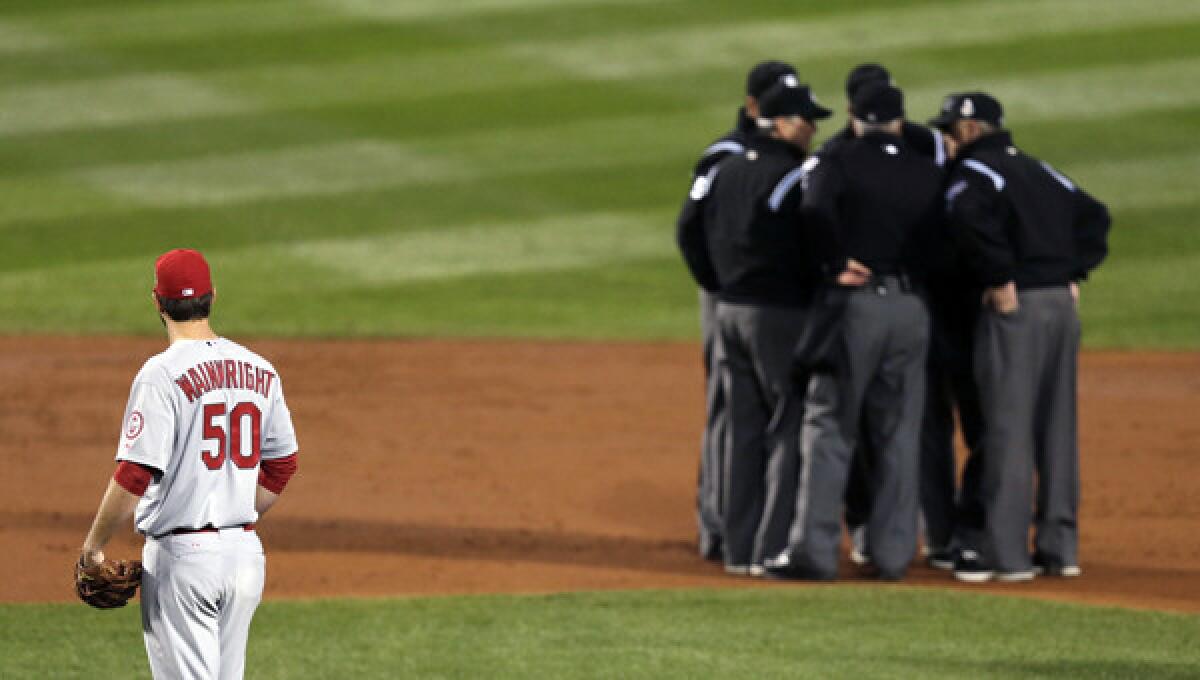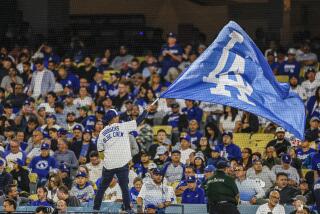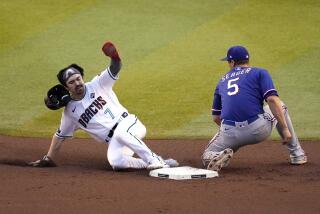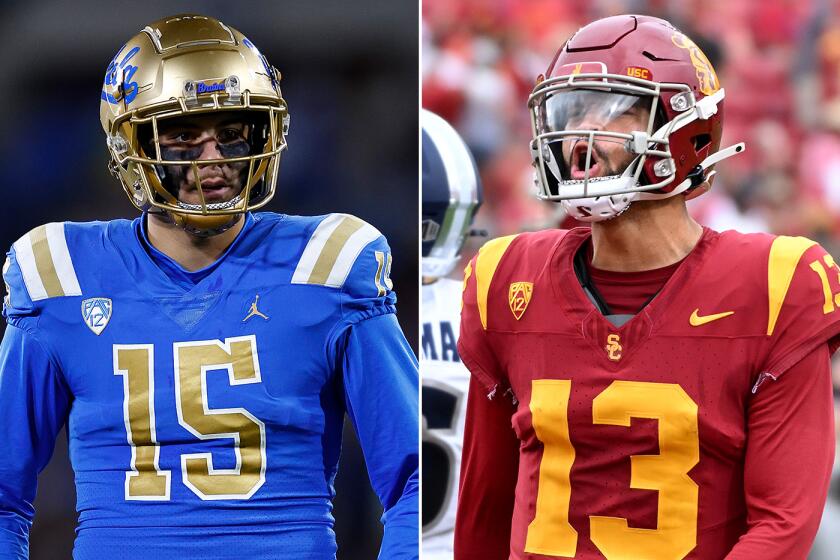Baseball’s new replay system may be great, but reviews aren’t in yet

St. Louis Cardinals starting pitcher Adam Wainwright watches as umpires discuss a ruling during Game 1 of the World Series against the Boston Red Sox on Oct. 23. The enhanced use of instant replay in 2014 should make tough calls a little easier to make for umpires.
During his six seasons as a coach for the San Diego Padres, Rick Renteria frequently reviewed videotape of what he believed were umpires’ questionable calls.
That experience led him to one unmistakable conclusion: Major League Baseball umpires are not always right.
But they usually are, far more often than not.
“It’s been a very high rate of success on the umpires’ side,” Renteria says.
This season, Renteria’s first as manager of the Chicago Cubs, will also be the first in which MLB teams can call on instant replay to challenge an umpire’s call.
The technology will be used in selected spring-training games beginning this week, applied in a system similar to those already employed by the NFL and NHL. It basically works like this:
A manager can challenge one play during the first six innings of a game by verbally indicating his intention “in a timely manner.” At that point, the play — just about anything other than a ball-strike call or a judgment ruling such as interference — will be reviewed from numerous camera angles by an umpire inside what MLB is calling its Replay Command Center in New York.
If the replay umpire finds “clear and convincing evidence to overturn the call,” the challenge is successful and the manager is allowed one additional challenge — for a maximum of two per game. However, after the sixth inning the decision to use replay is left solely to the umpire crew chief on the field.
Nuances such as what defines “a verbal indication” and “a timely manner” have not been determined.
“There’s going to be some bumps in the road, but that comes with any new initiative,” Cleveland Indians General Manager Chris Antonetti says. “I don’t think anyone’s expecting it to be perfect. This is what we go out with initially, but everyone expects a year from now we will have learned some things and made some adjustments.”
Baseball long resisted using video replay technology employed by nearly a dozen sports, from football and hockey to rodeo, cricket and rugby.
“Guys in baseball, we’re a little bit stuck in our routine,” Cleveland Manager Terry Francona says.
Baseball actually jumped ahead of other sports in 1999 when umpire Frank Pulli took a home run away from Florida Marlins slugger Cliff Floyd after looking at a television replay on a dugout monitor. It was the right call, but Pulli and his crew were chastised by baseball executives.
“Use of the video replay is not an acceptable practice,” Leonard Coleman, then president of the National League, said in a statement at the time. “The integrity of the game requires that judgments be left to on-field personnel.”
Turning a blind eye didn’t work long-term, though, because fans watching at home with the benefit of instant replay soon grew tired of blown calls occasionally affecting important games. The first chip at tradition came in August 2008, when Commissioner Bud Selig approved the limited use of replay for boundary calls involving home runs.
Some umpires were initially opposed to any use of video replay, but the umpires union agreed to expanding the rule this season with far more rank-and-file support than might have been expected.
“It’s going to help us,” says Alfonso Marquez, who has been a big league umpire for 15 seasons. “Everybody knows technology is here to stay and it’s just going to get better. The human eye is never going to be able to keep up.”
Marquez said it’s a terrible feeling when an umpire or a member of his crew makes a call that he later learns from video was wrong. “We just want to get it right,” he says.
As spring-training games begin, there are more questions than answers about exactly how the process will work.
“There’s going to be a lot of wait-and-see-type of things. How the video’s set up, what kind of time you have to get confirmation or whatever,” Oakland Manager Bob Melvin says. “So we’re not really sure how it’s going to play out.”
Angels Manager Mike Scioscia said determining when and if to challenge could be tricky.
“There’s going to be times when, even if you’re right, it might not be something you’re going to challenge if you’re going to be naked for four innings,” Scioscia says. “You can be right twice and you’re done until the seventh inning. You have to be cognizant of that.”
There will also be times when a manager doesn’t challenge a call — only to look back and wish he had.
“You can win or lose a game in the fifth or sixth inning on a play that most people might think is insignificant,” Seattle Manager Lloyd McClendon says. “But if you prove to be right, you might save your starter 12 to 15 pitches and he’s still in there in the seventh or eighth inning instead of being out in the sixth.”
Fans might also see a manager challenge a call just to change the pace of a game, perhaps to give a relief pitcher time to warm up, or trying to upset the rhythm of a dominant opposing pitcher.
The new system will also place a spotlight on team personnel not even in uniform.
Some teams have said they would hire replay specialists to relay potential challenges to their manager. Others, such as the Texas Rangers, will rely on their current video coordinators, whose main job has been to compile video libraries for players of every pitch and at-bat.
Whoever is watching, they need to be right if they say the call is wrong.
“If you don’t know, say you don’t know,” Rangers Manager Ron Washington says. “I need honesty.”
McClendon can’t say how the new system will affect his Mariners, but he does see a silver lining for himself.
During the five years he spent at his previous post, manager of the Pittsburgh Pirates, he ran up thousands of dollars in fines for arguing with umpires. Once, he even uprooted first base and took it back to the dugout with him.
Since replay should cut down on that type of histrionics, there’s a better chance both the manager and the bases can stay where they belong.
“It will save me a lot of money,” he says.
Times staff writer Mike DiGiovanna contributed to this report.
More to Read
Get our high school sports newsletter
Prep Rally is devoted to the SoCal high school sports experience, bringing you scores, stories and a behind-the-scenes look at what makes prep sports so popular.
You may occasionally receive promotional content from the Los Angeles Times.







